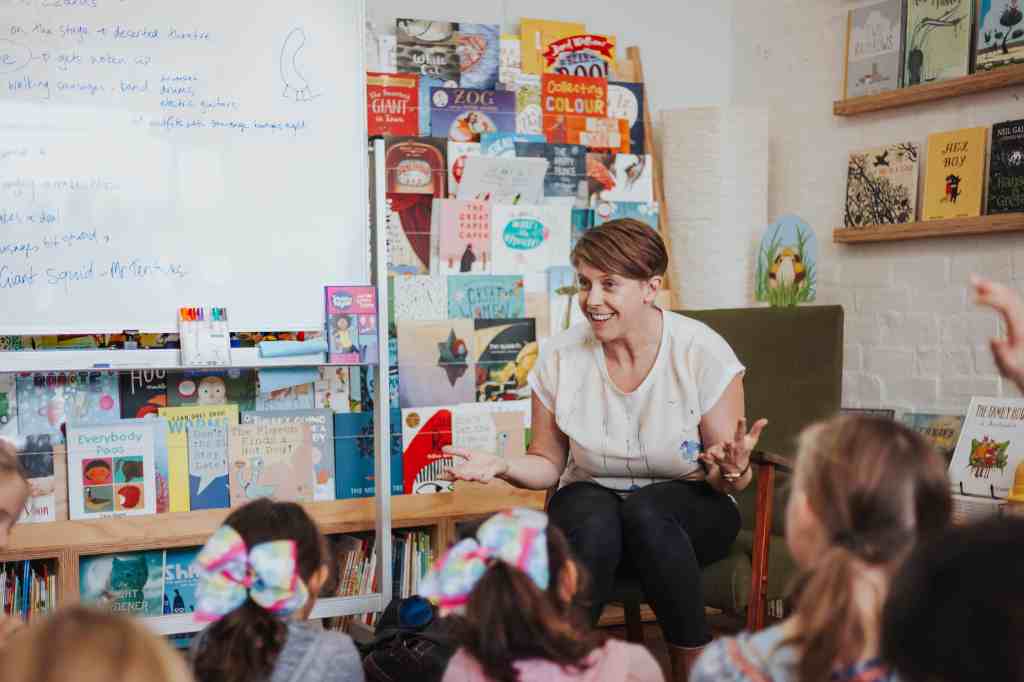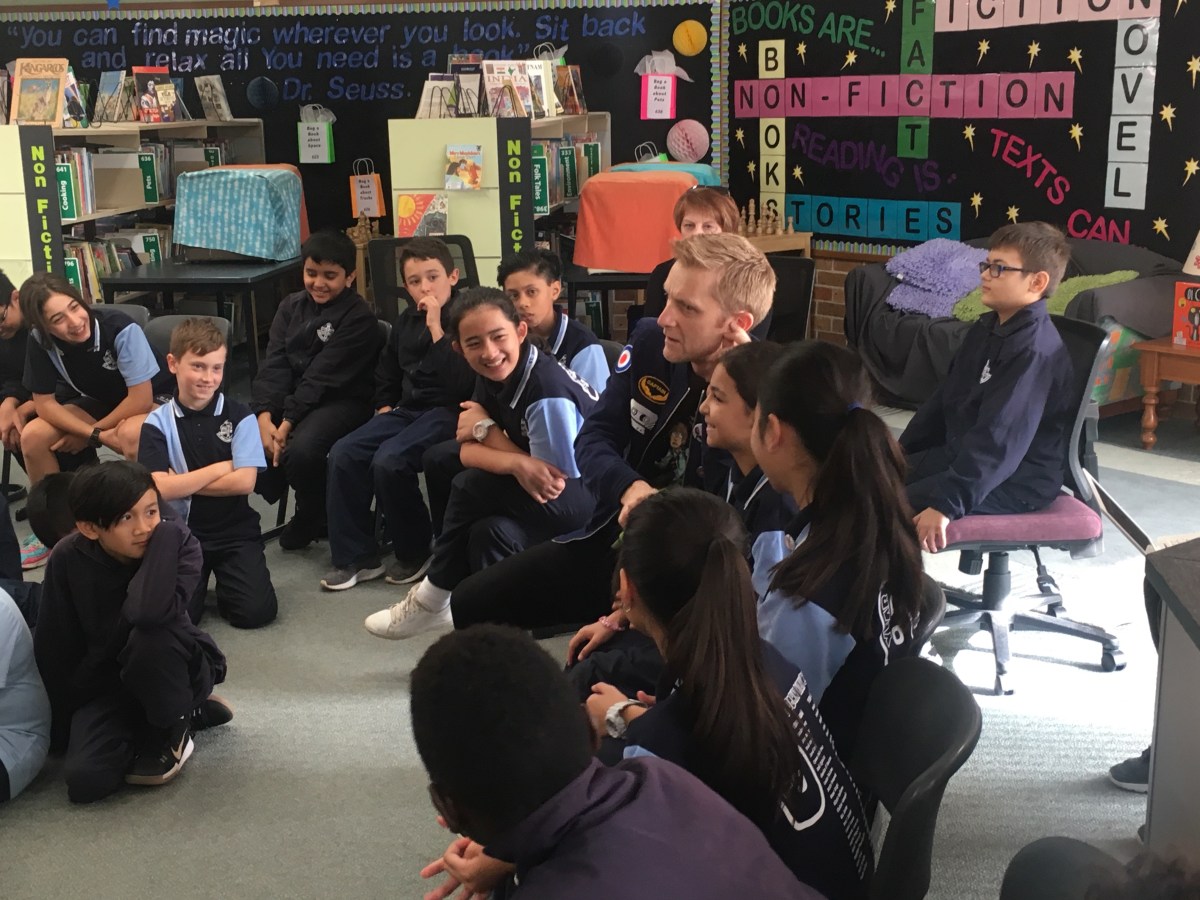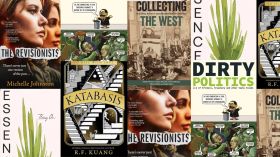Writers visit schools to give talks and run workshops for a number of reasons: as a side hustle to add to their income, as another avenue to sell their books, and as an opportunity to hone their public speaking skills.
ArtsHub asked three authors about their experiences, including advice for the novice school speaker, as well as finding out what a booking agency looks for before sending writers and illustrators to the classroom.
Ailsa Wild, who wrote the popular Squishy Taylor series, says that what she does is often dictated by the schools themselves. ‘I often read an excerpt of something I’ve written – most kids still enjoy being read to and it gives them a sense of who I am and what I do.
‘I have a 10-minute PowerPoint where I go through my process, and show messy drafts and edits, as well as pictures of some moments in my life that have inspired my stories. Then I often co-create a story with the group. My favourite thing is to have a room of kids throwing ideas at me while I scribble messy notes on a whiteboard and then to tell them back their own ridiculous story,’ she said.
Christine Keighery, who writes under the pen name of Chrissie Perry for her Go Girl series, has been concentrating on motivating kids to build interesting characters.
‘There seems to be a lack in the existing programs, which otherwise focus on “Sizzling Starts” and “Exploding Endings.” Also, I like to talk about the importance of dialogue in bringing characters to life,’ Keighery explained.
Read: Tips for launching your creative career
Like Wild and Keighery, Mick Elliot initially started his author tours to capitalise on the interest in his first middle grade book, The Turners.
‘I cover lots of topics ranging from what it’s like to work as a writer of books and TV series, how I come up with stories and characters and also some of my influences. I will usually do a short reading from one of my books and often will do an illustration demonstration,’ he said.
‘I try to make the sessions as interactive and as entertaining as possible. I am not there to teach them, but to engage them and get them enthusiastic about reading and storytelling. So I have a structure to my talks that I can tweak on the fly if the kids are really interested in one particular topic, or if they are getting a bit restless I can move on to the next thing.’
What are the rewards of speaking to a younger audience?
Elliott noted: ‘Primary school aged kids are a really enthusiastic audience. They are so grateful to be entertained and engaged. And they love to hear funny stories. For many students, it is the first time that they have ever seen an author in real life.’
Wild added: ‘Younger kids haven’t had the creativity hammered out of them, so making a story with them is a truly joyous, raucous explosion of ideas and ridiculousness and I get so much pleasure from that process. I like affirming that they are storytellers.‘

Keighery concured, adding: ‘With kids, you need to be reactive. A class level doesn’t always match a skill-set level. I have a number of activities with me so if one isn’t working I can switch to a more appropriate one.
‘But – kids are brilliant. They are funny and want to be involved. Though it can be exhausting to be so “on” and engage their interest, I rarely get nervous talking to kids as they are so non-judgemental’ she said.
Tips for talking to kids at schools
Wild advised: ‘Ask the kids questions – they’re smart, and the more interactive your talk is, the more engaged they’ll be. Whole chunks of my author talks are me going, “Who knows what my job is? What does ‘author’ actually mean? How long do you think that part of the process took me? Once I finished my first draft, I’m done and my publisher says it’s perfect, right? Is that what you think happens?”
Elliott stressed that ‘the most important thing is to remember that the students want to hear what you’ve got to say. They are excited to see you! You got them out of class for an hour so there is already a lot of good will before you even say anything.
‘It’s really handy to have props that can inspire your talk too. For example when I talk about my series The Turners – which is about a teenager who accidentally discovers that he can turn into animals – I often bring along stuffed toy animals as visuals. My favourite is a giant Komodo dragon. I also have a massive tarantula which always gets a great response.
Use visuals! Some PowerPoint or Canva slides can really help keep the audience engaged and can be used as visual cues for yourself during the talk. Remember that you are taking to the most visually literate generation in human history, so they will appreciate your use of slides and images.
Author and illustrator, Mick Elliott
‘But, always check the tech set-up of the school in advance. I always bring my laptop with a variety of cables and also a back-up of my presentation on USB, just in case,’ Elliott added.
Get your own ‘clicker’ too. They mean that you can control the speed of your slides without having to be near the school’s computer.
‘And just be prepared for anything. I’ve been asked so many funny questions over the years by curious kids including “Are you rich? Are you famous?”’ he added.
Keighery does a lot of roleplays with dialogue from her books. ‘Present sessions where the kids can be actively involved. This should be fun and different to regular classroom sessions,’ she suggested.
What does the booking agency look for?
ArtsHub also contacted Christina Cox from Booked out speaking agency, an organisation that handles the administrative tasks (logistics, marketing, invoicing) of sending authors and illustrators to schools, and asked her what they looked for when accepting authors. The agency currently has some 100 names on their list.
Cox acknowledged that writers are not expected to be performers but reiterated that preparation and enthusiasm are essential and confidence can be gained over time.
‘We look for speakers who have put some consideration into their sessions and understand why a school might want to book them. Do you offer fun and informative sessions that give students a break from their usual lessons? Is your book on the curriculum or something about your work that taps into the themes on the curriculum?’ she explained.
‘Speakers who offer a range of talks, writing, or illustration workshops and residencies are very easy to recommend to clients. For example, poets who can run a poetry slam are very popular with our clients!’
Keighery sums up the take away message of speaking at schools. The ultimate reminder, she said, is simply for authors ‘to promote a love of books and reading’.






